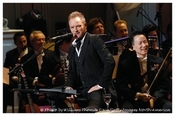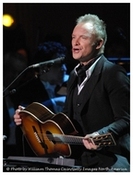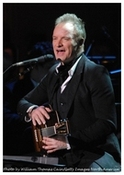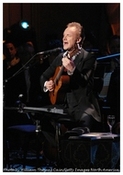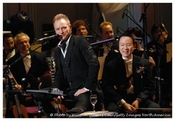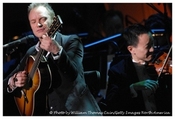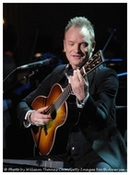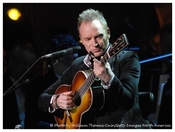
Sting with Philly orchestra: Synchronicity, sometimes...
The choice of former Police front man Sting to headline the 153rd anniversary concert of Philadelphia's Academy of Music on Saturday proved both inspired and indifferent, depending on his choice of songs.
Sting's 45-minute set of eight of his solo songs and The Police hits had moments that thrilled when they put a new twist on great songs. But some of the songs, mostly Sting's solo material - which has moved increasingly close to classical -- was too unfamiliar or too unchanged to offer similar thrills.
Playing for a nearly sold-out white-tie crowd, the 58-year-old Sting took the stage in a black suit with an open neckline and a black tie around his neck - and without the beard he's worn in recent appearances.
He opened with The Police's 'Message in a Bottle', singing in the island lilt of the original version. But the full, lush orchestration added amazing depth to the song and gave it a cinematic feel. In a way, it became the song you always envisioned in your mind.
He sang the chorus accompanied by a chiming piano, then strings, and ended by desperately wailing the title as if he truly was lost at sea. The audience gave him hearty applause that was unusual for the staid orchestra crowd.
'Roxanne' broke the decorum even more, drawing applause as soon as it was recognized and cheers and whistles when it was over. But it was well deserved. Sting was in extremely strong voice, and the song drew swirling tension from the orchestra, and sadness from the combination of guitar and violin.
'If I Ever Lose My Faith' wasn't all that different from the version on 1993's 'Ten Summoners's Tales', except that it was fuller and more dramatic, and Sting's voice strong and sure. 'Desert Rose' also was stirring.
But the set lost serious steam halfway through. 'Russians', the melody of which Sting said he ''stole wholesale'' from Russian composer Prokofiev, was flat. 'Moon Over Bourbon Street', which Sting sang standing in a spotlight or casually leaning on a piano - he spent most of the rest of the show seated with a guitar -- was less successful, and its orchestral treatment not much different from the original. In fact, it sounded like a show tune. 'Fragile' was similarly flat.
Even ''Every Breath You Take,'' the closing song, seemed to lose its dynamic appeal - becoming less of a story of obsession and more of a tribute to a lost love. Only when the song faded, then kicked back in to rock as it closed - the crowed even clapped along! - saved it.
It was disappointing that Sting played no songs from this millennium - the newest was from 1999's 'Brand New Day'. That meant he not only skipped everything from 'Sacred Love' and 'Songs from the Labyrinth', but everything from his new 'If On A Winter's Night...', which topped the classical charts.
A personal favourite, 'Fields of Gold', was sorely missed.
Sting gave props to Philadelphia, saying it was a thrill to play with ''one of the most August and celebrated orchestras in the world. He laughingly said his emotions could be summed up in two words: excitement and trepidation.
He also noted the Philadelphia roots of the bassist in his backing quartet, jazz artist Christian McBride, and McBride's teacher, the orchestra's associate principal bassist, Neil Courtney. Sting said McBride and another Courtney pupil, renowned composer Stanley Clarke, ''made me recalculate myself as a double bassist and seriously take up singing.''
In addition to Sting, the night brought a wonderful three-song set by Philadelphia-trained tenor Juan Diego Flores and wonderfully whimsical direction by Rafael Brubeck de Burgos, chief conductor and artistic director of the Dresden Philharmonic.
(c) Liegh Valley Music by Jon Moser
The choice of former Police front man Sting to headline the 153rd anniversary concert of Philadelphia's Academy of Music on Saturday proved both inspired and indifferent, depending on his choice of songs.
Sting's 45-minute set of eight of his solo songs and The Police hits had moments that thrilled when they put a new twist on great songs. But some of the songs, mostly Sting's solo material - which has moved increasingly close to classical -- was too unfamiliar or too unchanged to offer similar thrills.
Playing for a nearly sold-out white-tie crowd, the 58-year-old Sting took the stage in a black suit with an open neckline and a black tie around his neck - and without the beard he's worn in recent appearances.
He opened with The Police's 'Message in a Bottle', singing in the island lilt of the original version. But the full, lush orchestration added amazing depth to the song and gave it a cinematic feel. In a way, it became the song you always envisioned in your mind.
He sang the chorus accompanied by a chiming piano, then strings, and ended by desperately wailing the title as if he truly was lost at sea. The audience gave him hearty applause that was unusual for the staid orchestra crowd.
'Roxanne' broke the decorum even more, drawing applause as soon as it was recognized and cheers and whistles when it was over. But it was well deserved. Sting was in extremely strong voice, and the song drew swirling tension from the orchestra, and sadness from the combination of guitar and violin.
'If I Ever Lose My Faith' wasn't all that different from the version on 1993's 'Ten Summoners's Tales', except that it was fuller and more dramatic, and Sting's voice strong and sure. 'Desert Rose' also was stirring.
But the set lost serious steam halfway through. 'Russians', the melody of which Sting said he ''stole wholesale'' from Russian composer Prokofiev, was flat. 'Moon Over Bourbon Street', which Sting sang standing in a spotlight or casually leaning on a piano - he spent most of the rest of the show seated with a guitar -- was less successful, and its orchestral treatment not much different from the original. In fact, it sounded like a show tune. 'Fragile' was similarly flat.
Even ''Every Breath You Take,'' the closing song, seemed to lose its dynamic appeal - becoming less of a story of obsession and more of a tribute to a lost love. Only when the song faded, then kicked back in to rock as it closed - the crowed even clapped along! - saved it.
It was disappointing that Sting played no songs from this millennium - the newest was from 1999's 'Brand New Day'. That meant he not only skipped everything from 'Sacred Love' and 'Songs from the Labyrinth', but everything from his new 'If On A Winter's Night...', which topped the classical charts.
A personal favourite, 'Fields of Gold', was sorely missed.
Sting gave props to Philadelphia, saying it was a thrill to play with ''one of the most August and celebrated orchestras in the world. He laughingly said his emotions could be summed up in two words: excitement and trepidation.
He also noted the Philadelphia roots of the bassist in his backing quartet, jazz artist Christian McBride, and McBride's teacher, the orchestra's associate principal bassist, Neil Courtney. Sting said McBride and another Courtney pupil, renowned composer Stanley Clarke, ''made me recalculate myself as a double bassist and seriously take up singing.''
In addition to Sting, the night brought a wonderful three-song set by Philadelphia-trained tenor Juan Diego Flores and wonderfully whimsical direction by Rafael Brubeck de Burgos, chief conductor and artistic director of the Dresden Philharmonic.
(c) Liegh Valley Music by Jon Moser

